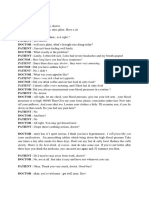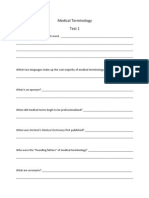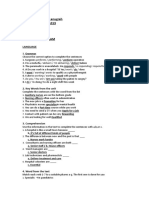0 ratings0% found this document useful (0 votes)
197 viewsFinal Test. Ms Nunuk
The document is an English task assignment for a student at STIKES-PPNI-MOJOKERTO. It contains two units - The Hospital Team and In and Around the Hospital. Each unit has sections on grammar, reading comprehension, and vocabulary. The grammar sections contain sentences to complete. The reading sections provide information about hospital departments and staff. The comprehension questions test understanding of these sections. The vocabulary sections match terms to their meanings and hospital areas to body parts. The student is instructed to complete the tasks and tables provided to demonstrate their English skills and mastery of medical terminology.
Uploaded by
Ontel DjowoCopyright
© © All Rights Reserved
Available Formats
Download as DOCX, PDF, TXT or read online on Scribd
0 ratings0% found this document useful (0 votes)
197 viewsFinal Test. Ms Nunuk
The document is an English task assignment for a student at STIKES-PPNI-MOJOKERTO. It contains two units - The Hospital Team and In and Around the Hospital. Each unit has sections on grammar, reading comprehension, and vocabulary. The grammar sections contain sentences to complete. The reading sections provide information about hospital departments and staff. The comprehension questions test understanding of these sections. The vocabulary sections match terms to their meanings and hospital areas to body parts. The student is instructed to complete the tasks and tables provided to demonstrate their English skills and mastery of medical terminology.
Uploaded by
Ontel DjowoCopyright
© © All Rights Reserved
Available Formats
Download as DOCX, PDF, TXT or read online on Scribd
You are on page 1/ 6
STIKES- PPNI- MOJOKERTO
Final English Task
Name : luthfi dhiya atika Date Submission:
Student No: 201301058 Score :
Instructions:
1. Please, do each task carefully.
2. Test your own vocabulary mastery-you may consult to a dictionary.
3. Keep your original ideas.
4. Your answer should be written in the table provided on page 5 (just copy the table)
5. Please, submit it in one folder (1. Nursing profile, 2. English Task 3, and 3. Peer
Scoring sheet).
The hospital team
Unit 1
A. Grammar
Choose the correct option to complete the sentences.
1 Surgeons performs/ performing/ perform operations.
2 Im a midwife, I delivers/ Im delivering/ deliver babies.
3 The paramedic is unavailable. He responds/ s responding/ respond to an emergency.
4 A: Do you work in a hospital? B: Yes, I work/ do/ does.
5 I want/ wanting/ wants to qualify as a physiotherapist.
6 I like to working/ working/ work with people.
7 Do you/ You are/ Are youtaking the patient to surgery?
8 I do/m doing/ to do a night shift this week.
B. Reading and vocabulary
A big hospital is like a small town; it needs thousands of people to make it work. All these
people are organized into teams and each person in each team has a rank and often a specialism. In
the past, the health care teams chain of command was simple: doctors made decisions and gave
senior nurses orders. Senior nurses then instructed junior nurses, and so on. Things are changing. In
many countries nurses have much more responsibility than they once had.
One thing is not changing; it is still a doctor who is in charge of a patients treatment. In
Britain, that doctor is called a consultant. Next in line to the consultant is the registrar. Consultants
and registrars train the junior doctors who are called house officers or interns. Junior doctors work
the same long, unsocial hours that nurses do on the wards. The most senior nurses are nursing
officers; they are administrators. Then come ward managers who supervise staff nurses and
students.
It is not only doctors and nurses who deliver treatment and care; there are many other specialists
too.
For example, there are physiotherapists who specialize in exercises to treat injury or dysfunction
and
occupational therapists who help patients manage every-day living. There are also many people the
patient does not meet like lab technicians doing the tests and pharmacists dispensing medicines.
Like any town, a hospital has teams of office staff and ancillary workers such as porters,
orderlies, technicians, drivers, cleaners, receptionists and cooks. Every team is essential for the
delivery of treatment and care. This includes the volunteers who, without pay, raise money for the
hospital and run shops, cinemas, libraries and restaurants.
B.1. Comprehension Questions
Use the information in the text to complete the sentences with a, b or c.
1 A hospital is like a small town because .
a its busy.
b its full of different kinds of people.
c there are so many buildings.
2 The difference between now and the past is that .
a nursing is easier.
b nurses make more decisions.
c nurses work harder.
3 Consultants and nursing officers are both .
a senior staff.
b house officers.
c in charge of a patients treatment .
4 Ward managers are .
a nurses.
b office workers.
c senior doctors.
5 Lab technicians and pharmacists .
a deliver treatment and care.
b work in the background.
c help the specialists.
6 Hospital volunteers are .
a sometimes needed.
b paid well.
c essential.
C. Words from the text
1. Match each verb 17 to a suitable phrase ag. The first one is done for you.
1 specialize a new staff
2 train b unsocial hours
3 make c a busy department
4 dispense d injuries and dysfunctions
5 run e quick decisions
6 work f in paediatrics
7 treat g medicines
2. Further vocabulary practice
Underline the correct words in italicsto complete the sentences.
The first one is done for you.
1 The nurse understands the treatment/ to treat.
2 You can consult/ consultant the doctor about it.
3 I want to see a specialist/ specialize/ specialism.
4 Im working in reception/ receptionist.
5 The director manager/ management/ manages the hospital.
6 A registrar helps to trainer/ train/ training junior doctors.
7 He is nursing/ nurse full time now.
Unit 2 In and around the hospital
A. Grammar
Choose the correct option to complete the sentences.
1 Walk into / over / through the doors at the end of the corridor.
2 Turn left / away / on after Pathology.
3 Theres a sign under / over / at the door.
4 Its easiest to take the lift up to / on the top / into Surgery.
5 The Pharmacy is the second door on / at / opposite the right.
6 The car park is in front / inside / opposite the main entrance.
7 Go straight at the bottom of / under / toward sthe stairs.
8 Your ward is by / opposite / next to Physiotherapy.
B. Reading and vocabulary
Some hospitals specialize in particular conditions like cancer or psychiatric illness. Other
hospitals
specialize in particular types of patients like geriatrics, children or the terminally ill. However, the
best
known type of hospital is the general hospital which deals with almost everything, has ambulance
crews and beds for both intensive care and long stay.
A big general hospital has many different specialist departments. Identifying departments
can
be confusing because different hospitals use different names for the same thing. For example,
one hospital may have a childrens unit which a different hospital calls Paediatrics. Accident
and
Emergency (A&E) in one hospital is called Casualty in another.
There are many other examples. The department that specializes in heart problems, is
sometimes called Coronary Care. Others call it Cardiology or Cardiovascular medicine.
Nephrology, the department that treats illnesses of the kidney is sometimes called the Renal Unit.
Gastroenterology (digestive system) is sometimes the Department of Hepatology.
Hospital staff often use abbreviations for departments. For example, they refer to Obs and
Gynae. This is a department combining Obstetrics (pregnancy), and Gynaecology (womens
reproductive organs). They call Otolaryngology, ENT (ears, nose & throat), mostly because it is
much easier to say.
B.1 Comprehension Questions
Answer the following questions correctly!
a What three types of hospitals are mentioned in the text?
b Which is the most common type of hospital?
c Why are hospital department names confusing?
d Which two departments mentioned in the text, deal with the gastrointestinal tract?
e How many departments is Obs & Gynae?
f What is a common name for the Otolaryngology Department?
C. Vocabulary
1. Find terms in the text that mean the same as a-g.
The first one is done for you.
a mental health problems
b elderly people
c people who are dying
d paramedics
e treatment for critically ill patients
f stomach and intestines
g uterus, ovaries and fallopian tubes
2. Further vocabulary practice
Match department names 1-6 with parts of the body a-f.
Department name Parts of the body
1 Coronary Care a tonsils
2 Gynaecology b cervix
3 Obstetrics c bowel
4 Gastroenterology d heart
5 ENT e kidneys
6 Nephrology f placenta
The Sudents Answering Table
Name : luthfi dhiya atika Date Submission:
Student No: 201301058 Score :
Unit 1 The Hospital Team Unit 2 In And Around the Hospital
A. Grammar A. Grammar
1. Surgeons perform operations 1. Walk through the doors at the end of the corridor
2. I deliver babies 2. Turn left after Pathology
3. Hes responding to an emergency 3. Theres a sign at the door
4. Yes, I do 4. Its easiest to take the lift up to Surgery
5. I want to qualify as a physiotherapist 5. The Pharmacy is the second door at the right
6. I like to work with people 6. The car park is opposite the main entrance
7. Are you taking the patient to surgery? 7. Go straight at toward the stairs
8. I do a night shift this week 8. Your ward is next to Physiotherapy
B. Reading Comprehension B. Reading Comprehension
1. B 1. general, cancer and phy
2. C 2. general hospital
3. C 3. because different hospital use different names for
the same thing
4. A 4. Nephrology and Gastroenterology
5. A 5. 2 departments
6. C 6. ENT (ear, nose and throat)
C. Vocabulary C. Vocabulary
1) 1)
a. C a. psychiatric illness
b. A b. geriatrics
c. E c. terminary ill
d. G d. ambulans crew
e. F e. intensive care
f. B f. Gastroenterology
g. D g. Gynaecology
2) 2)
1. The nurse understands the treatment/ to
treat.
1. D
2. You can consult/ consultant the doctor
about it.
2. B
3. I want to see a specialist/ specialize/
specialism.
3. F
4. Im working in reception/ receptionist. 4. C
5. The director manager/ management/
manages the hospital.
5. A
6. A registrar helps to trainer/ train/ training
junior doctors.
6. E
7. He is nursing/ nurse full time now.
You might also like
- English For Nurses and Medical ProfessionalsNo ratings yetEnglish For Nurses and Medical Professionals4 pages
- Handout Lesson 2 - Unit 1 - English I 2021No ratings yetHandout Lesson 2 - Unit 1 - English I 20212 pages
- Lesson 1 - Hospital Departments-Staff-EquipmentNo ratings yetLesson 1 - Hospital Departments-Staff-Equipment30 pages
- Some Medications, I'm Prescribing Tablets Which Bring Down The High Blood Pressure TakeNo ratings yetSome Medications, I'm Prescribing Tablets Which Bring Down The High Blood Pressure Take1 page
- Vocabulary - Medical Care at The Hospital and Dental CareNo ratings yetVocabulary - Medical Care at The Hospital and Dental Care3 pages
- Health Professionals: Nama: Anindya Alysyah Putri NIM/Kelas: 201910300511026 / D3 KeperawatanNo ratings yetHealth Professionals: Nama: Anindya Alysyah Putri NIM/Kelas: 201910300511026 / D3 Keperawatan3 pages
- Lesson 1 - Word List Prevedi Reči Na Srpski JezikNo ratings yetLesson 1 - Word List Prevedi Reči Na Srpski Jezik25 pages
- Cambridge English For Nursing Intermediate VocabActivitiesU01 10No ratings yetCambridge English For Nursing Intermediate VocabActivitiesU01 1040 pages
- Pixl Knowledge Test Questions - Aqa b1 Core Science - Legacy 2016 and 2017No ratings yetPixl Knowledge Test Questions - Aqa b1 Core Science - Legacy 2016 and 20176 pages
- Root Words, Prefixes .Suffixes in Medical FieldNo ratings yetRoot Words, Prefixes .Suffixes in Medical Field26 pages
- A. Hospital Department: Unit 1 Around The Hospital100% (1)A. Hospital Department: Unit 1 Around The Hospital5 pages
- PiXL Knowledge Test ANSWERS - AQA B1 CORE Science - Legacy (2016 and 2017)No ratings yetPiXL Knowledge Test ANSWERS - AQA B1 CORE Science - Legacy (2016 and 2017)12 pages
- English For Nursing 2: Vocational English Teacher's BookNo ratings yetEnglish For Nursing 2: Vocational English Teacher's Book17 pages
- Student's Book Compilation - Latest Edit (1) (Recovered) (Recovered)No ratings yetStudent's Book Compilation - Latest Edit (1) (Recovered) (Recovered)91 pages
- Career Path For Medical Technology Students100% (1)Career Path For Medical Technology Students17 pages
- Introduction To Dentistry 1 Year Lect. 1No ratings yetIntroduction To Dentistry 1 Year Lect. 144 pages
- 100 Medical English Phrasal Verbs With Examples - Part 2 (51-100)0% (1)100 Medical English Phrasal Verbs With Examples - Part 2 (51-100)1 page
- Gastroscopy Examination of Esophageal & Stomach100% (1)Gastroscopy Examination of Esophageal & Stomach24 pages
- NURUL SABRINA PRATIWI english for nursesNo ratings yetNURUL SABRINA PRATIWI english for nurses7 pages
- TUGAS BAHASA INGGRIS - MARYANTI A.Md.KepNo ratings yetTUGAS BAHASA INGGRIS - MARYANTI A.Md.Kep3 pages
- Some Medications, I'm Prescribing Tablets Which Bring Down The High Blood Pressure TakeSome Medications, I'm Prescribing Tablets Which Bring Down The High Blood Pressure Take
- Vocabulary - Medical Care at The Hospital and Dental CareVocabulary - Medical Care at The Hospital and Dental Care
- Health Professionals: Nama: Anindya Alysyah Putri NIM/Kelas: 201910300511026 / D3 KeperawatanHealth Professionals: Nama: Anindya Alysyah Putri NIM/Kelas: 201910300511026 / D3 Keperawatan
- Cambridge English For Nursing Intermediate VocabActivitiesU01 10Cambridge English For Nursing Intermediate VocabActivitiesU01 10
- Pixl Knowledge Test Questions - Aqa b1 Core Science - Legacy 2016 and 2017Pixl Knowledge Test Questions - Aqa b1 Core Science - Legacy 2016 and 2017
- A. Hospital Department: Unit 1 Around The HospitalA. Hospital Department: Unit 1 Around The Hospital
- PiXL Knowledge Test ANSWERS - AQA B1 CORE Science - Legacy (2016 and 2017)PiXL Knowledge Test ANSWERS - AQA B1 CORE Science - Legacy (2016 and 2017)
- English For Nursing 2: Vocational English Teacher's BookEnglish For Nursing 2: Vocational English Teacher's Book
- Student's Book Compilation - Latest Edit (1) (Recovered) (Recovered)Student's Book Compilation - Latest Edit (1) (Recovered) (Recovered)
- 100 Medical English Phrasal Verbs With Examples - Part 2 (51-100)100 Medical English Phrasal Verbs With Examples - Part 2 (51-100)



























































